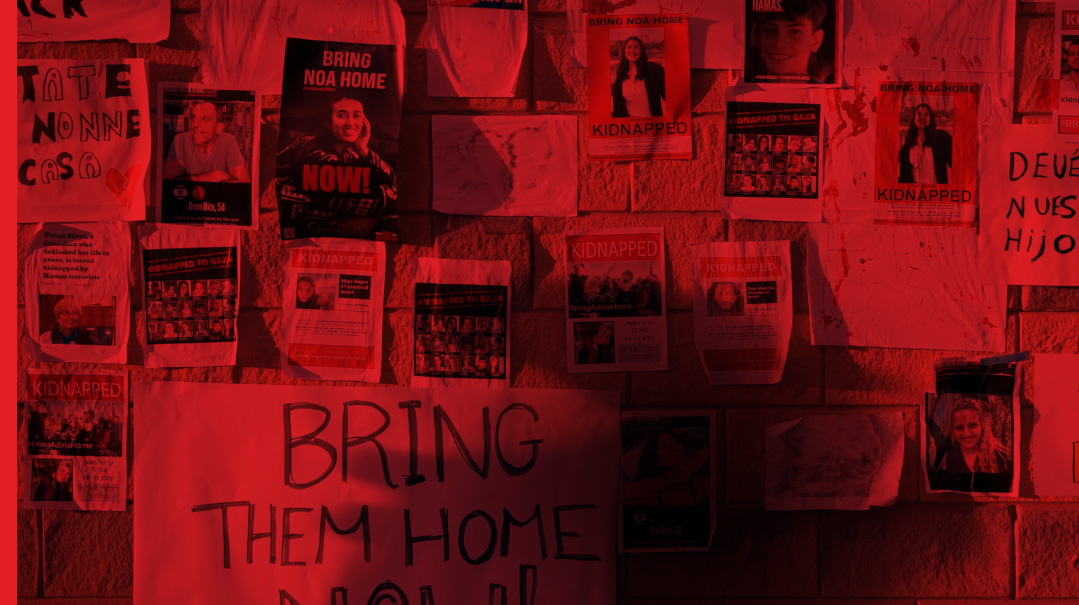A Never-Ending Nightmare

As the fate of dual citizens is negotiated by Qatar and the US, Israeli captives could be left behind

Photos: Flash 90
The Dans were informed that three family members were kidnapped to Gaza, Elia Cohen’s family was notified that he’s in Hamas captivity, 19-year-old Roni Eshel is classified as “missing,” as are taxi driver Eitan Levi and Eden Zecharia. The families of the missing and kidnapped speak of their loved ones and charge: “The state is abandoning us, it could cost lives”
“W
e’re in a horror movie, a nightmare, this is the worst period in our lives,” Lee Dan, three of whose relatives are being held in Gaza, tells Mishpacha. “Our biggest fear is that the IDF will launch a ground offensive before they can be rescued, and who knows what will happen to them. It’s clear that Hamas intends to use them as human shields.”
Dan speaks for hundreds of families who were leading normal, happy lives just two weeks ago. It seemed unimaginable that their peace of mind could be shattered so quickly. But on the morning of Shabbos Simchas Torah, everything changed. These families’ loved ones were abducted to Gaza or are listed as missing. The captives include children and babies, elderly Holocaust survivors, women and mothers, as well as people with special needs. What they all have in common is that they’re innocent civilians caught up in the cruelest massacre the Jewish People has known since the Holocaust.
As of press time, 222 families had received official notice from Israeli authorities that loved ones were being held by Hamas. Two captives — a mother and daughter from Chicago — were released by Hamas over Shabbos, and there were reports of another pending large release of hostages with dual citizenship. But there are many other families with loved ones classified as missing who are walking around in complete uncertainty, trying to hold on to hope for a miraculous happy ending to the story.
“They’re Just Kids”
The Dan family’s nightmare began when they received word that three of their loved ones were abducted and are being held by Hamas: Erez Calderon, 12; Sahar Calderon, 16; and their father, Ofer Calderon, 50.
“There are no words to describe what our family is going through these days,” Lee Dan, a member of the family, tells me. “The children’s mother is my cousin, they were both in the Gaza Envelope and survived the massacre by hiding in the safe room and holding the door shut for hours to prevent the terrorists from breaking in. Even when the terrorists set the house on fire and the handle was red hot, they didn’t let go, and that saved their lives. But the other family members were taken as abductees to Gaza. We were in contact with them the entire time by text, so we know that Ofer and his two children were abducted when they fled the safe room and tried to hide in the bushes.”
The Dan family, like the families of other abductees, initially received no update regarding their loved ones, who were simply declared missing. “But shortly after the abduction, a video came out showing Erez being dragged off by Hamas,” Lee explains. “So we knew that they had probably been abducted, but the official notice about their abduction only came in last week
“The hardest part,” she adds in a choked voice, “is our constant anxiety about what’s happening to them in captivity. Erez is ten days short of his 12th birthday. It’s terrifying to think about what they’ve been going through all these days and what’s going through their minds. Maybe they’ve given up hope that anyone will come save them. After all, they were locked in the safe room for so many hours without any soldier or rescue force arriving, so maybe they even think there’s no one in the world who cares about them? They’re just kids... We can’t bear these thoughts.”
At first, the family harbored hopes that two other relatives, Carmela Dan and her 12-year-old granddaughter Noya Dan, had also survived and been taken into captivity. But late last week, the family received the devastating news that their bodies had been identified at the Gaza border.
Carmela Dan’s daughters — Hadas Calderon, the mother of Erez and Sahar, and Galit Dan, Noya’s mother — celebrated Carmela’s 80th birthday last week while she was still missing. But then the family went into shivah. And with one of their children already buried, and two others captive to Hamas, it’s hard to imagine what the mothers are going through.
“The mothers, in my opinion, still can’t digest it, they’re busy lobbying and fighting, posting pictures of them all over the world, and we’re all trying to activate our connections wherever possible,” says Lee Dan. “We understand that there are many good people in the country who are trying to help, but we still feel that not enough is being done for us. There’s a sense of abandonment. Our nightmare scenario is that the IDF will flatten Gaza while our family members are there and they won’t stand a chance of survival. We can’t bear this thought, so we’re crying out and pleading: ‘Release them now, bring them home now, before it’s too late.’”
“The Videos Are Unwatchable”
The family of 27-year-old Elia Cohen was among the first to receive information that he was being held in Gaza by Hamas. “My brother Elia was last seen at the festival in Re’im,” says his sister Yuval Tias. “We spent two and a half days in fear and confusion. Then soldiers showed up at our door and informed us that they had located Elia’s mobile device in Gaza.
“In fact, they were only confirming what we already knew, because friends who were at the party had already told us every detail of what had happened. Apparently, he was able to escape by car as soon as the sirens sounded. When it became clear that there were terrorists down the road, he ditched the car and entered a nearby shelter with 30 other people. A few minutes later, terrorists came in and sprayed everyone at point-blank range. My brother was miraculously saved when bodies fell on him, effectively shielding him, but he was able to whisper to his friends that he’d been hit in the leg. Moments later, Hamas terrorists pulled him out of the shelter amid shouts and screams. Based on this info, we knew with almost absolute certainty that he had been kidnapped. We also recognized him in Hamas’s videos, but the army officially confirmed it for us.”
Yuval said the news that Elia might still be alive gives the family some hope — but also a host of new worries.
“It’s sad to say, but as the hours went by, we realized that the chances of finding him alive were getting slimmer, so when the news came that he had been kidnapped, we felt some relief. At least we could still hope. But despite that, the thought won’t leave us for a moment. We believe he’s injured, though we don’t know how severely, and we’re beside ourselves worrying whether he’s receiving medical treatment, whether he has food and water and a place to sleep, or he’s suffering terribly or being tortured.
“The absurd thing is that we’ve received no information from the government or any other official source. Although we have soldiers with us all the time trying to give us encouragement and support, but they don’t know anything either. Our only source of information is the videos and pictures published by Hamas. These videos are unwatchable. Small children, babies, the elderly, mothers and soldiers, or civilians who have nothing to do with the conflict. And behind every one of them are family members who are so worried and anxious for their well-being.
“We try to hold on to hope, but we can’t stop being afraid. I beg you to pray for the well-being of my brother, Elia ben Sigalit, and for the safety of all the other abductees, for everyone to return to their families safe and sound and for an end to this never-ending nightmare.”
Piecing Together a Puzzle
Our conversation with Eyal Eshel occurs on the 11th day of the war, but for him it’s no different from day one, as he has yet to receive information regarding his daughter Roni, listed as missing.
“Roni is an IDF soldier, 19 years and three months old, and at the time of the attack she was a field observer in Nahal Oz,” he says. He can’t forget a single detail of the black Shabbos they endured: “We started the morning, like all Israelis, with a series of sirens. At 9:27 a.m., my wife received a text message from Roni: ‘Hey Mom, I’m fine, I’m in the Hamal [operation room], love you.’ And that’s it, that was her last message.”
Eyal says that at that moment, they didn’t have an inkling of what was happening. “We knew that Roni wouldn’t be able to answer our calls because she was on shift, but the message she sent that morning was her last sign of life. Since then, she’s disappeared, and no one can tell us where she is or how she’s doing. As the days passed, we realized that neither the IDF nor the defense establishment are in a position to provide any information, so I did everything I could to piece together the puzzle myself.”
The details he pinned down were few and far between, but he has been able to sketch an outline of what happened in those fateful hours.
“Based on the details we’ve been able to piece together, it seems that Roni was on duty with other observers,” Eyal says. “Some of those on watch with her survived, and others were killed or kidnapped. We’re left with many open questions that we would expect at least partial answers for from the relevant officials — from the prime minister to Gal Hirsch, head of the Kidnapped and Missing Persons Task Force — but that’s not happening. No one has come to me to explain the situation or answer my questions.”
Eyal dismisses the claims that the security forces are doing everything they can for the families of captives and the missing.
“That’s a blatant lie. Neither we nor the five other families whose daughters have been classified as missing soldiers have received any information, and no one from the security establishment has come to our home to tell us about the investigation.
“The only acknowledgment we received was last Tuesday, when an IDF officer showed up at our door and read out a document to us in the coldest and most impartial tone: ‘Roni Eshel, an IDF soldier, is hereby declared missing, signed, the IDF.’ Unfortunately, my trust in the defense establishment has been severely damaged. It pains me to see how everyone is focusing solely on the civilian hostages, but no one mentions the six soldiers who are missing.”
Despite his pain, Eyal is nowhere near ready to give up.
“Of course I’m not resting for a moment, I’ll do anything to bring Roni home. Even if it means talking to Hamas, even if it means going to Iran or reaching out to any figure whatsoever. I’ll do anything for my daughter, and for the other girls, because they’re my responsibility too. All of us parents believe that they’re alive, and we’re committed to doing everything possible to save them.”
Consumed with Worry
Taxi driver Eitan Levy is also listed as missing at this stage. “Day after day goes by, and we have no leads,” sighs Sigalit Preschel, his only sibling. She too claims that no one has approached her or spoken to her about the situation, even though Eitan was one of the first people to go missing in the invasion.
“The morning it all happened, I woke up to the sound of sirens,” she says. “At 6:50 a.m., Eitan called. He asked how I was doing and told me that he was near the Gaza border. Eitan is a taxi driver and he had taken a passenger there. He told me that there were sirens and explosions, and that he was very scared.
“A moment later, I heard him say in a faint voice: ‘Oh, no!’ and then a shout in Arabic: ‘Allahu Akbar.’ He didn’t talk anymore, but his mobile device continued working for a few more minutes. I tried to call out to him: ‘Eitan, Eitan!’ but there was no response. In the meantime, my husband and son joined me, and we could hear Arab voices on the other end of the line. Then there was silence, Arab voices again, and then again silence. Then I heard the car driving in reverse gear, and then complete silence.
“Of course, we gave the recording to the police, with additional details, but we couldn’t get any information about his status. There isn’t an ounce of information — it’s completely surreal.”
Sigalit notes that since that day, she hasn’t been able to do anything. “Eitan is my only brother, a guy with a heart of gold, no one would say anything bad about him. He works hard for a living and wouldn’t hurt a fly. I’m consumed with worry about what he’s going through and where he is. This not knowing is paralyzing, I feel like I can’t survive one more day like this. I only hope they find him soon.”
Corinne, mother of Eden Zechariah, also classified as missing, sounds equally anguished and helpless. “Eden was at the festival in Re’im, but she rushed out as soon as the first sirens sounded,” she says. “She fled in a car with two other party-goers who were trying to escape to the center of the country, but at some point the terrorists spotted them and opened fire on the car. A friend of Eden’s who was sitting in the back of the car told me that Eden was hit by the gunfire, so she couldn’t run away. There was another passenger with them who managed to get away, but is also listed as missing. That’s all we know about Eden’s status, and I keep praying that we get more details.”
Corinne and her family also have unanswered questions. “Our main question right now is, where is the vehicle Eden was riding in? We tried all kinds of ways to find out and we can’t get an answer. That information could be crucial, because it’s possible the terrorists drove the car to Gaza with her inside. I would have expected the security forces to update me on whether the vehicle’s in Israel or not, but I haven’t gotten an answer.”
Trying to track down the vehicle information fed Corinne’s hopes, or at least gave her a concrete task to work on. With that avenue running into a dead-end, she is facing long hours and days of agonizing uncertainty.
“At first we had high hopes that Eden would be found and everything would end well, but as time passes and no information comes in, it’s becoming harder and harder,” she admits. “We aren’t losing hope, and we prefer no news to bad news, but we can no longer bear the tension, stress, and uncertainty.”
Like the other family members we spoke with, Corinne is frustrated by the seeming lack of movement from the security forces.
“It’s important for me to emphasize that we appreciate the work of the security forces, but we feel that there is a lack of professionalism when it comes to the investigations regarding the missing persons and abductees. I heard from one of the fathers who has a missing son that at one point he was informed that his son had been killed. He insisted on identifying the body, and it turned out that it wasn’t his son. And then it happened to him again.
“It makes me sick to think that people might be buried after being mistakenly identified, when in reality the people they’ve identified are hostages in Gaza. We’re angry at the lack of accountability, and the worst thing is that there’s no one to talk to about it.”
A Helping Hand to Families
After the scale of the disaster became clear, about 600 families of the kidnapped and missing came together to form the Families’ Headquarters for Kidnapped and Missing Persons. The group was founded by Attorney Dudi Zalmanovitch, a well-known activist who has family among the kidnapped, as do other founding members of the group who are working tirelessly for the families.
Attorney Dan Eldad of the Eldad-Peretz law firm is one of the activists at the headquarters. Eldad formerly led the financial crimes department at the State Prosecution Office and even served as deputy public prosecutor.
“We’re not setting ourselves up as an alternative to the official body responsible for the issue, but as a complementary force,” Eldad explains. “We’re trying to help however we can, and we’re working on a number of levels. Our main focus is meeting the families, providing support from professionals in every area, and helping as needed. This isn’t only about the direct problem created by the situation, but also with many technical issues that need addressing. For example, if someone was in the process of concluding a business deal and the other party needs closure, or if someone purchased a house and even signed a letter of agreement, that’s another example where we can step in.
“There are also a lot of mundane issues that we have to deal with. After all, none of these people planned on being kidnapped or going missing, and their family and professional lives were going full throttle.
“In addition, we’re making contact with authorities abroad in order to create immense global pressure to release the hostages. We’re also exerting pressure on various international bodies that have financial relations with Hamas, and we’re continuing to work on this from every angle.
“One important initiative we led this week was getting the signatures of a hundred legal experts from Israel and abroad to a letter calling the taking of hostages as a gross violation of international law. These actions represent a severe violation of human rights, even war crimes and crimes against humanity. We sincerely hope that this letter will help secure the release of the hostages. We’re operating on a number of fronts, and while we realize that single thing among all the things we’re doing will force Hamas to release the hostages, every action helps and gets us closer to the goal.”
Eldad understands the disappointment that many families are feeling toward the security establishment for how it has handled the situation. But he advises that everyone keep in mind the horrible situation that was thrust upon the authorities, and recognize that they are trying to make progress.
“At the start of this, the defense establishment was in a very bad place, but it’s been improving on the go. Some families have received information and it’s clear they’re working very hard on this. We believe that it’s possible to do ever better, and we’re trying to help with that ourselves, our goal being the same: to bring our people back as quickly as possible.”
(Originally featured in Mishpacha, Issue 983)
Oops! We could not locate your form.







